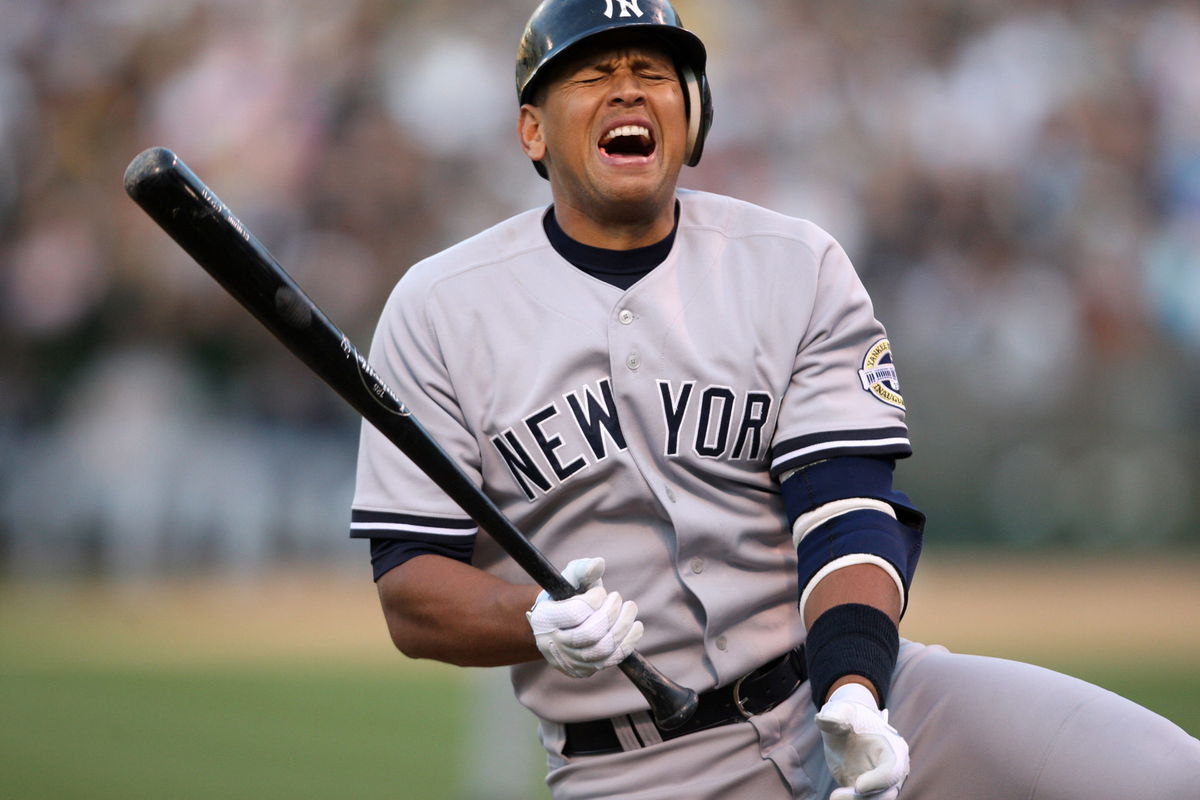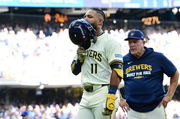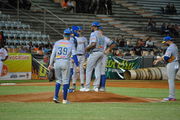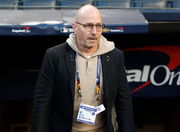
Getty
OAKLAND, CA – AUGUST 18: Alex Rodriguez #13 of the New York Yankees grimaces after being hit by a pitch during first inning action against the Oakland Athletics during the game at the Oakland-Alameda County Coliseum August 18, 2009 in Oakland, California. (Photo by Brad Mangin/MLB Photos via Getty Images)

Getty
OAKLAND, CA – AUGUST 18: Alex Rodriguez #13 of the New York Yankees grimaces after being hit by a pitch during first inning action against the Oakland Athletics during the game at the Oakland-Alameda County Coliseum August 18, 2009 in Oakland, California. (Photo by Brad Mangin/MLB Photos via Getty Images)
Everyone makes mistakes. But not everyone’s blunders cause their lives to fall apart like Alex Rodriguez‘s did. Ever since the truth came to light, the former New York Yankees star has spent many sleepless nights wondering where he went wrong. How could a person, who seemingly had everything in life, dig a hole for themselves so deep that it felt impossible to come out?
Watch What’s Trending Now!
Throughout his illustrious MLB career, A-Rod’s talent spoke for itself. He was not superhuman so as to not go through slumps. But what mattered was that Rodriguez always pulled himself out of the funk at the end. His family, his team, his coaches – everyone was there to support him. However, as it later turned out, the former pro baseballer leaned on something else entirely.
ADVERTISEMENT
When did Alex Rodriguez first take steroids?
2009 was a rollercoaster of a year. The end of the year would bring A-Rod his first and only World Series ring, but the year had a tumultuous beginning. On February 7, 2009, Selena Roberts of Sports Illustrated accused a total of 104 players, including Alex Rodriguez, of using performance-enhancing drugs in 2003. The incident took a life of its own because a few days later, the former Yankee publicly admitted to the fact. This was after repeated assurances that earlier allegations against him were false.
ADVERTISEMENT
Rodriguez sat down at a press conference to admit to everything. From 2001 to 2003, when he played for the Texas Rangers after signing the largest contract in league history at the time, A-Rod reportedly used steroids.
ADVERTISEMENT
Unable to handle the immense pressure that came with that title and at the same time wanting to prove that he was worth it, A-Rod consumed steroids.
Top Stories
Baseball News: 3 Venezuelan MLB Players’ Status Unknown After US Military Operation

Blue Jays Told to Slam Door on Kyle Tucker After Stunning Offseason Splash Supercharges Toronto

Panic Hits Toronto Over Bo Bichette’s Blue Jays Career as Ross Atkins Leaves Pirates Reeling With Kazuma Okamoto Move

What Will Happen to the Venezuela Baseball League After US Military Strike?

Brian Cashman’s Offseason Disaster Comes Back to Haunt as Yankees Slammed With Harsh Label

After his confession, which was attended by ex-wife Cynthia Scurtis, his hometown disparaged him endlessly. The New York Post had an endless number of names to call him – A-Hole, A-Roid, A-Rat. Unfortunately, the situation only got worse.
ADVERTISEMENT
Mitchell Report 2007:
Formally known as the Report to the Commissioner of Baseball of an Independent Investigation into the Illegal Use of Steroids and Other Performance-Enhancing Substances by Players in Major League Baseball, the Mitchell Report opened up Pandora’s Box.

ADVERTISEMENT
Former Democratic Senator George Mitchell dedicated 20 long months to investigating high-profile baseball players for steroid use. It was a different MLB era. The rules weren’t hard and fast, and some took advantage. Mitchell set out to right those wrongs and wrote a 409-page report on the history of drug usage in MLB.
Additionally, he alleged the names of 89 players in relation to steroid use, both past and present. Rodriguez was not named but three days after the report came out, he flat-out denied ever using PEDs in an interview. Mitchell later said that he did not have names from the 2003 testing and could not include them in his report.
ADVERTISEMENT
Biogenesis scandal 2013:
While 2009 earned the former shortstop harsh comments from some, 2013 turned his life upside down. Rodriguez was already scheduled to sit out the season at least halfway through the year because of hip surgery. In June, he jumped the gun and announced on Twitter that his doctor had cleared him to play.
ADVERTISEMENT
Apparently, that was too much for Yankees General Manager Brian Cashman. He told The New York Post, “You know what? When the Yankees want to announce something, [we will]. Alex should just shut the f— up.” On the same day that Rodriguez returned for his first game of the season on August 5, MLB announced his suspension, pending appeal, throughout the 2014 season for his role in the Biogenesis Scandal.
ADVERTISEMENT
READ MORE – 9 Years Later, Alex Rodriguez Reveals How His Infamous PED Suspension Was a ‘Curse’ and a ‘Gift’
Rodriguez made an appeal and was allowed to play the rest of the 2013 season. But that was the last of baseball he would see until 2015. He was handed the longest suspension MLB had ever seen, the entirety of the 2014 season.

A-Rod was accused of using PEDs, specifically human growth hormone and testosterone, and was suspended for 162 games. 12 other players were involved as well, but their punishment was less severe.
The league accused him of not only using drugs but also trying to cover up his violations “by engaging in a course of conduct intended to obstruct and frustrate the Office of the Commissioner’s investigation.”
A-Rod’s stats before and after steroids
The real truth is only known to the player himself. Many have tried to investigate and come up with the best possible solutions available to them. Looking at the official numbers then, it can be assumed that Rodriguez used drugs from 2001 to 2003. After debuting in MLB in 1996, A-Rod hit 184 home runs. Let’s say that’s an average of a little less than 37 per year, up until 2001.
From 2001 to 2003, the then-Rangers player hit 156 homers, averaging 52 per year. According to his statements, Rodriguez went clean when he joined the Yankees. Up until his confession in 2009, he felt he had given some of his best performances. After all, the two MVP titles from 2005 to 2007 spoke for themselves.
Looking at his stats, the former ballplayer hit 208 home runs from 2004 to 2008, averaging a little less than 42 per year. 2005 and 2007 were also the years when Rodriguez seemingly recovered his power when 11.4% of his hit balls went over the fence.

Admittedly, it would be impossible to correctly guess what the true extent of his steroid usage was. Rodriguez was indisputably a good player, even without drugs in his system. It was more that he felt unable to handle the extreme pressure his position put him in that he felt the need to cheat. Ah, if only one could turn back the clock! Rodriguez could certainly benefit from it.
How did PEDs affect his personal life?
Before his past became tainted, Rodriguez was already something of a villainous figure in the league. A hotheaded young player with a classic rags-to-riches story, many disliked his attitude. But it wasn’t the underhanded way he sometimes played the game, yelling “Ha!” to distract his rival, or discrediting former pal Derek Jeter that brought him his hardest trials.
It was the fact that he had to own up to his mistake and look deep inside him so that he could face his daughters with the truth. It was such an extremely emotional and vulnerable time for the former Yankee that he had to take help from his ex-wife, Cynthia Scurtis.

“I told Cynthia, ‘When I sit down with the girls, they’re gonna be listening to me, but they’re gonna be looking at you, and chances are I’m not gonna make it past first base because I’m gonna probably start breaking down.’ And sure enough, I almost didn’t get out of home plate,” he told Joe Buck in the Audience Network show ‘Undeniable.’
A single mistake from his youth cost him the opportunity of a lifetime.
A-Rod’s Hall of Fame case
In his full year of suspension, Alex Rodriguez took the phrase self-reflection to another level. He got into therapy during the dark days post-suspension and emerged a new man on the other side. His tough, bad-boy persona took a 180-degree turn, and he appeared more levelheaded. The former shortstop owned up to his mistakes. But unfortunately, none of it helped his Hall of Fame case.
The question is ultimately about having an unfair advantage and the Writer’s Association refuses to overlook that fact. In his last two years of eligibility, Rodriguez has been rejected too. Perhaps a point to look forward to is that his votes went up from 34.3% to 40.3%, which is still a far cry from the required 75%.
A-Rod remains hopeful. He has argued his case before and still has eight more years of eligibility left. One never knows what could happen at that time.
WATCH THIS STORY – From Alex Rodriguez to Barry Bonds: 5 Top Players Who Aren’t A Part of the MLB Hall of Fame
ADVERTISEMENT
ADVERTISEMENT
ADVERTISEMENT

